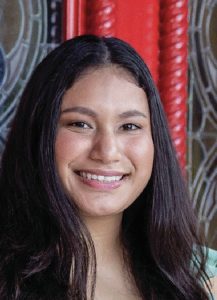|
Only have a minute? Listen instead
Getting your Trinity Audio player ready...
|
Angel Espinosa is a 2021 Corps Member with Teach For America. She is an eighth-grade Algebra 1 teacher with IDEA Mission.
What motivated you to apply to join Teach For America and choose to teach in the Rio Grande Valley?

I had always been interested in education; my mom is a teacher and my relatives had colorful experiences in their schools growing up that I loved hearing about. In college, my focus was pre-med, but my mentors encouraged me to take the time to explore other passions because I was so young and they saw that I had many different interests. I learned about TFA, and I became fired up and excited as I read about the mission and participants’ experiences. I wanted to make an impact on young people and share the lessons I’d learned that I wish I had known growing up; for instance, I didn’t realize how my socialization had deterred me from appreciating my Mexican culture and heritage. That also influenced me to move to the Rio Grande Valley; I wanted to move here to be immersed in my cultural roots that I had long been disconnected from and experience life on the border.
What has been one of the most surprising things you’ve come to learn about education during your time as a classroom leader?
I went into teaching with a fresh, energetic mindset and thought it would be easy to motivate students to learn Algebra. I had an abrupt realization that students are reluctant to go to school, and also realized that education remains largely teacher-led as opposed to student-led. Although teachers may have the best intentions coming into the classroom, the reality is that there are a myriad of factors that make it challenging to keep those intentions top of mind and put them into practice on a daily basis.
If you could change one thing for your students, what would it be?
If I could change one thing for my students, it would be to eliminate testing. In many ways, testing cultivates a culture of viewing students as numbers and not as holistic individuals. Students have significantly more to offer than their performance on standardized exams. Those qualities even align with showcasing that information they genuinely need to know, but the anxiety that is often produced by testing does more damage than good. Students love to show off how they’ve succeeded in their understanding of content; I’ve seen it in their enjoyment of application exercises and review activities. Measuring student progress through project-based learning and assessments would be more enriching than any standardized test.
What lessons are you learning now that will help you continue to work toward educational equity in the future?
Being a teacher has opened my eyes to the impact of finances on the opportunities of children in underserved areas. For students to have an equal opportunity to learn, they will need access to resources that will support them in their understanding of materials and their motivation to understand/learn.
Can you share an anecdote or personal experience from your classroom or school?
I experienced a difficult incident during my first few months of teaching which left students and staff wondering if I was going to stick around. The year went on one day at a time. Towards the end of the year, when things had mellowed out, a student hung around after school to chat and asked me “why are you still here, miss?” I was confused by the question, because all teachers were required to stay for tutoring that day and replied, “we have tutoring today and it lasts until 5:30.” They then explained that they were asking why I had continued working despite all the challenges they saw me face throughout the year, and that they admired my perseverance. All I could say was that I really loved my students and nothing was going to stop me from dedicating all the energy and time possible to ensure that they were supported, encouraged, and loved in my classroom. Needless to say, I was deeply touched by this encounter. I will always remember the feeling I had knowing that my kids were paying more attention than I realized.
Teach for America (TFA) is the national nonprofit organization committed to the idea that one day, all children will attain an excellent education. To this end, the organization partners with communities to inspire the next generation of leaders to address unequal educational opportunities that fall along the lines of race and class. They begin this lifelong work with an initial two-year commitment to teach in some of the nation’s most underserved schools. Here in the Rio Grande Valley, 61 corps members work in seven districts across the region.



